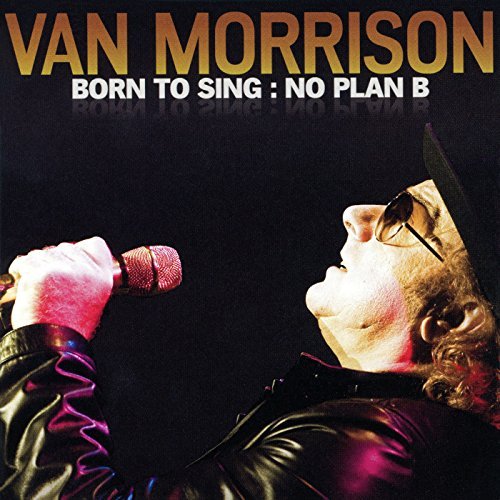
Van Morrison
Born to Sing: No Plan B
Release Date: Oct 2, 2012
Genre(s): Blues, Contemporary Singer/Songwriter
Record label: Blue Note
Music Critic Score
How the Music Critic Score works
Buy Born to Sing: No Plan B from Amazon
Album Review: Born to Sing: No Plan B by Van Morrison
Fairly Good, Based on 9 Critics
Based on rating 5/5
"Sartre said hell is other people/I believe that most of them are," Van Morrison sings in "Goin' Down to Monte Carlo," one of the 10 tracks on this vividly irritated, vocally compelling record. Later in the song, he rails against "phony pseudo-jazz" and frets that "After everything I've worked for/They're going to throw everything away." Morrison doesn't say who "they" are, but his fear is clear. At 67, on his 35th studio album, Morrison feels like an endangered species, surrounded by jive and crooks, with nothing to fall back on but his sinuous growl – like gravel rolling through velvet – and scatting hallelujahs.
Based on rating 4/5
Touring his legendary Astral Weeks album appears to have rejuvenated Van Morrison. His 35th solo studio album is his jazziest: the warm brass and catchy, sweet melodies recall 1970's Moondance. But the music's velvet glove delivers some of his hardest-hitting lyrics. With the global economic meltdown providing inspiration, End of the Rainbow finds him rueing capitalism, materialism and social climbing.
Based on rating 4/5
Van Morrison's first studio album since 2008's Keep It Simple has a jazzier feel than anything he's done for a while and that is all to the good. There's a nice bit of Hammond organ on first track Open the Door (To Your Heart) while the horn section trade solos throughout, with Morrison himself playing alto sax; the whole has a live feel and an organic warmth that recalls the Caledonia Soul Orchestra. Lyrically, it is a strong set, too, and lays into the failed materialism of the modern world on tracks such as End of the Rainbow; Vanologists will recognise the reference to Beside You from Astral Weeks in the title and refrain of Retreat and View.
Based on rating 7/10
Born to Sing: No Plan B is Van Morrison's first studio offering in four years and his second for Blue Note. It is the longest span of studio silence in his career. Uncharacteristically, he recorded the set in his hometown of Belfast with a crack sextet that includes a three-piece horn section with an alto saxophone. Trombonist Alistair White also features prominently; his warm timbres, muted colors, and delightful solos are centerpieces in many songs.
Based on rating 6.8/10
Van Morrison’s latest, Born To Sing: No Plan B, seems to be a challenge in the game of cutting slack. I spent most of my first listen wincing—and also wincing about wincing. Morrison’s Moondance continues to enjoy glitzy popularity in the modest Grimm household down in Florida. Long before I discovered all 14-year-old boys felt forced to add “Brown Eyed Girl” to his limited guitar tune canon, it was the song my dad would fix the needle to for me.
Based on rating 2/5
Van Morrison’s latest, Born To Sing: No Plan B, is a shock of an album. It’s no small feat that Morrison, 67, still surprises and confounds on his 34th studio album, and Born To Sing is deserving of several career superlatives: It’s both the most traditionally jazz leaning and the crankiest, most pissed-off record the singer’s ever released. That those two superlatives don’t at all seem naturally congruous is part of the joke from Morrison, who spends a good 50% of Born To Sing’s 60 minute running time barking and growling, like an undergrad first discovering Marx, about economic inequality and the meaninglessness of money over a slick, light jazz.
Based on rating 1.5/5
Even in his dotage, Van Morrison’s transcendental fantasies never seemed wholly implausible. Van the soulman, Van the visionary, Van the Celtic bard backed with a beat strong enough to propel him into mystic realms (“way up in the heaven,” as he murmured on 1967’s “Astral Weeks”), Morrison’s competing aspirations could sometimes prove infuriating, pompous, or willfully opaque. But this very adaptability kept his work relatively vital even through the ‘90s (skipping over a regrettable stretch of the ‘80s that was even more unkind to lesser lights).
Based on rating D-
Van Morrison has released 35 studio and live albums over his 50+ years of music making and has helped write numerous top ten songs. You can’t swing a jazz musician without hitting a band playing “Moondance”, and you can’t turn on a classic rock station without hearing “Brown Eyed Girl” once an hour. These songs are the epitome of a classic.
Opinion: Very Good
You’ll either grin or cringe when Van Morrison gets to the second song on his new album. On “Goin’ Down to Monte Carlo,” while trying to escape his problems, he is annoyed by what he finds en route: “Playing in the background of the restaurant/ Some kind of phony, pseudo jazz.” It’s funny, perhaps unintentionally, because that’s sort of what the iconic Irish singer-songwriter has accomplished on “Born to Sing: No Plan B,” his second album for Blue Note Records after his Grammy-nominated “What’s Wrong With This Picture?” in 2003. Then again, Morrison has a sly sense of humor and might be in on the joke.
'Born to Sing: No Plan B'
is available now

